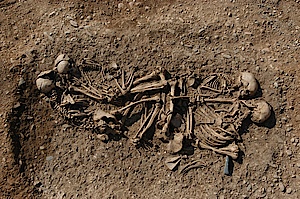Science of Human History

Recent technical advances in investigating biomolecules, such as stable isotope research and genome wide DNA sequencing, but also latest developments in handling and analyzing big datasets allow to tackle questions about the human past in fundamentally new ways, opening up an entirely new spectrum of information from sample repositories and data collections. The new methods enable us to obtain detailed information about genetic relationships, geographical origin, selective processes or genetic structure of ancient human, plant, animal or even pathogen populations using only miniscule samples. By adapting and further developing innovative tools, in particular in the fields of genome sequencing, bioinformatics, language documentation, and phylogeography new knowledge is also generated about the history of various linguistic, cultural and social phenomena. Some of our research questions are for example the origin and spread of the Indo-European and other language families, and the correlation between environment and religious beliefs.
Contact
Beate Kerpen
Research Coordinator, Max Planck Institute for the Science of Human History
Phone: +49-3641 686-601
Email: kerpen(at)shh.mpg.de, info(at)shh.mpg.de
Beate Kerpen
Max Planck Institute for the Science of Human History
Petra Mader
Max Planck Institute for the Science of Human History
Prof. Dr. Martin S. Fischer
Insitute of Systemic Zoology and Evolutionary Biology with Phyletic Museum, Friedrich Schiller University Jena
Prof. Dr. Peter Ettel / Prof. Dr. Martin Joachim Kümmel
Insitute of Oriental Studies, Indo-European Studies and the Archaeology of Prehistory to the Early Middle Ages, Friedrich Schiller University Jena
Universities and Institutes
- Friedrich Schiller University Jena (FSU)
-Department of Psychology
-Faculty of Medicine
-Phyletic Museum - Max Planck Institute for Biogeochemistry, Jena
- Max Planck Institute for Chemical Ecology, Jena
- Leibniz Institute for Natural Product Research and Infection Biology – Hans Knöll Institute (HKI), Jena
- Max Planck Institute for Evolutionary Anthropology, Leipzig
- State Office for Heritage Management and Archaeology
- University of Tuebingen, Institute for Archaeological Sciences






